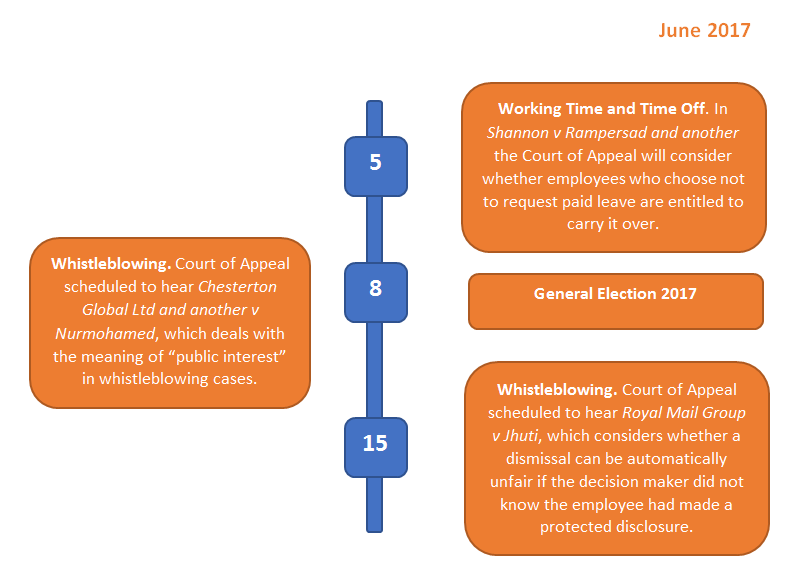General Election 2017. We published a new practice note examining the manifestos from the Labour, Conservative and Liberal Democrat parties and their implications for employment law. The General Election will be held on 8 June 2017. Practical Law’s General Election 2017 landing page contains materials summarising the implications of the manifestos, policy statements and pledges made by the main political parties of interest to lawyers and their clients in a number of key areas.
Discrimination. The EAT has upheld the decision of an employment tribunal that a job applicant with Asperger’s required to undertake a multiple choice test suffered indirect discrimination when the employer refused to make an adjustment to the format of the test.
Employment Appeal Tribunal. The EAT refused to exercise its discretion to extend the time limit where an appeal was submitted an hour late.
Gig economy. The Work and Pensions Committee published a report into the growth of self-employed workers in the gig economy. It concludes that many companies are using self-employed workers as cheap labour while excusing themselves of responsibilities towards workers. The report recommends that national insurance contributions are equalised, self-employed people are encouraged to save for pensions and the default position should be that individuals have the status of workers.
Holiday pay. The EAT has confirmed that a three-month gap between underpayments of wages breaks a “series of deductions”, limiting the scope to make retrospective claims for unpaid holiday pay under the unlawful deduction from wages jurisdiction. In doing so, the EAT has affirmed the 2014 decision of Mr Justice Langstaff in Bear Scotland Ltd v Fulton and another [2015] IRLR 15.
Unions. The European Court of Human Rights has rejected an application brought by a blacklisted trade unionist for breach of Article 8 (right to private life) of the European Convention on Human Rights, and has held that his application for breach of Article 11 (freedom of association) was inadmissible.
The Supreme Court held that an employer was wrong to deduct 1/260 of an employee’s annual salary, rather than 1/365, when its employees went on strike. This was because the employees were employed on annual contracts and it was accepted that the employees, who were teachers, regularly worked outside of their contracted hours, including weekends and holidays. The court made the point that a critical feature of the case was that the contracts in question were annual ones. Had they not been, the position would have been “very different”.
Whistleblowing. The Court of Appeal has decided that, in a whistleblowing dismissal case, it was irrelevant that an employer genuinely believed an employee’s disclosure was not protected. A disclosure will be protected if it meets the statutory conditions in Part IVA of the Employment Rights Act 1996 and this is an objective test.
In the news, the ONS revealed jobs with the highest suicide risk, Matthew Taylor called for an end to “bad work” ahead of his review, half of people on zero hours contracts believe they are not entitled to holiday pay, sickness absence is at the lowest since records began, Deliveroo removed the controversial clauses in their employment contracts, employers begin to introduce silver quota, the online court pilot is expected to go live this summer and it was reported that the Taylor review will recommend an overhaul of zero hours contracts.
In our blog, Aisling Byrne looked at how the apprenticeship levy will negatively affect businesses in Northern Ireland, Louise Skinner discussed the change in financial regulation under the FCA’s reference regime, Daniel Northall examined recalculating early conciliation time limits when an employee completes early conciliation before their employment ends, Marianne Tutin clarified the scope of whistleblowing protection and Michael Reed considered whether contract law can handle the gig economy.
Next month
Key developments to look out for in June 2017.

For recent and forthcoming developments, don’t forget What to expect in employment law, Case tracker and Legislation tracker.



